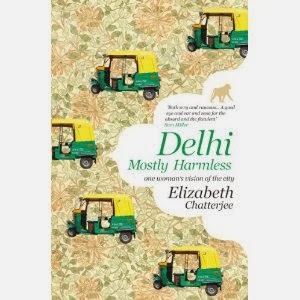Introduction
·
ISBN –
978-8184003567
·
Genre: Non- Fiction
·
Publishers:
Random House Publishers
·
Price:
Rs.299/- (I got this book from the publisher for a review)
'... nobody who lives
there, nobody at all, has much good to say about Delhi.' Along with Milton
Keynes, Detroit and Purgatory, Delhi is one of the world's great unloved
destinations. So when Elizabeth Chatterjee makes her way from the cool hum of
Oxford to the demented June heat of heat of Delhi to research her PhD, she find
herself both baffled and curious about the je ne sais quoi of this city of
'graveyards and tombstones'.
As flanêur and sagacious
resident, Liz takes us through the serpentine power structures, the idyll, the
bullshit-peeling layer after layer of the city's skin to reveal its
aspirations, its insecurity, its charm and finally its urban dissonance.
Uncannily perceptive, predictive and hysterical, Delhi Mostly Harmless puts a
firm finger on the electric pulse of Delhi.
Behind
The book
 |
| Source: Google Images |
About
the author
Born and raised in Yorkshire, Liz
Chatterjee is a perpetual student. She graduated with a double first in History
from Merton College, Oxford, before moving on to study contemporary Indian
politics. Following brief stints working with Unicef and Oxfam, she is
currently writing a doctorate on Indian energy policy. In 2008, she was elected
a Fellow of All Souls College, Oxford, where she lives when not in Delhi.
Me
thinks
Delhi
for me spells a whole treasure chest of memories. Having spent my childhood
there, playing in its dusty lanes, eating at those crowded stalls, doing a
Delhi Darshan every Sunday perched on my grandfather’s shoulders, Delhi looked
pretty. Like I always say it has a strange charm to it. Historic, magnificent
and royal. I knew I had to read this book for I wanted to feel the same old
Delhi I have grown up with.
Recently
when I went back there after a long time I lost my heart to it again. It is
poetry in itself for me. Seeing Delhi from the author’s point of view was a
visual treat as she made me see things the way perhaps I would have never seen.
She has dissected Delhi decently well and has put her finger exactly on its
pulse. I also love the way she has done the index of the book. Very innovative
and quirky.
I love
the narration in the book. It is not like the usual travelogue rather it is a
narrative where the author clearly says this is how I see it – you may or may
not see it like this.
Foodie Verdict
This book is like Delhi Chaat - tangy, tasty, spicy and tongue tantalizing!
 |
| Source: Google Images |